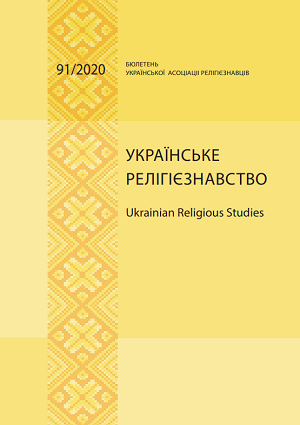Muslim Apocalyptic Consciousness: Representation of Imam al-Mahdi (a.s) in Literature
DOI:
https://doi.org/10.32420/2020.91.2115Анотація
The concept of apocalypse is well established in all the major religions of the world, be they Semitic religions (which include, Judaism, Christianity and Islam) or Hinduism. The underlying idea behind the concept in all the religions remains the same, that is, the world will come to an end. The end itself, which has been called the Judgment Day, Day of Resurrection, or the Day of Retribution or Reckoning will be preceded by some signs. It has also been called the day of Apocalypse, the day when the whole world will be destroyed. One of the distinct forms of it is Muslim Apocalypse about which a lot has been written. However, the argument of the present research paper shall be to examine the concept of the Mahdi (a.s) primarily from the Shi’te Muslim point of view. The premise of the argument is that Shi’te argument or concept of the Mahdi (a.s) is far more substantial having a solid theoretical foundation than the other perspectives about it. No wonder, therefore, the concept of the Mahdi (a.s) has manifested itself in literature across cultures and ages. There are so many poets, primarily, Muslim poets who have highlighted this concept in their poetry and thus the research paper shall make an attempt to look at some of those poets and their understanding of it.
Посилання
Bukhari, Imam (2019). Ṣaḥīḥ al-Bukhārī. www.www.sahih-bukhari.com. Retrieved Jun 25, 2019.
Cook, David (2008). Contemporary Muslim Apocalyptic Literature. Syracuse University Press.
Dawood, Abu (2019). Sunan Abu Dawood. Hadithcollection.com. Retrieved Jun 27, 2019.
Elyas, Nezami Ganjavi (1993). Kolliyat. Ta’avon, Tehran.
Esma’eel, Azar (2009). The Splendour of Love. Tehran, Sokhan.
Filiu, Jean Pierre (2010). Apocalypse in Islam. Translated by M.B. DeBevoise. University of California Press.
Habibi, Aminullah (2011). Islam and Democracy. Prospects and Possibilities: A Critical Analysis of the Theory of the Religious Democracy of Dr Abdulkarim Soroush. University of Westminster.
Hanbal, Ahmad Ibn (2019). Musnad Ahmad ibn Hanbal (4 Vols). Darussalam.
http://en.al-shia.org/content/mahdi-shi%E2%80%99ism-2
http://iqbalurdu.blogspot.com/2011/08/zabur-e-ajam-73-part-2-12-khizr-e-waqt.html
http://spiritual-pakistan-future.blogspot.com/2012/03/mehdi-concept-of-mehdi-explanation-of.html
https://en.wikipedia.org/wiki/List_of_Mahdi_claimants#M%C4%ABrz%C4%81_Ghul%C4%81m_A%E1%B8%A5mad
https://en.wikipedia.org/wiki/Mahdi
https://en.wikipedia.org/wiki/Mahdi#Sunni_Islam
https://en.wikipedia.org/wiki/Signs_of_the_reappearance_of_Muhammad_al-Mahdi
https://www.drsoroush.com/English/By_DrSoroush/E-CMB-TheSaviourAndReligiousRevival.html
Iqbal Namah. Volume 2, Number 2, Spring 2002. Youngstown State University Iqbal Academy Pakistan.
Iqbal, Sir Mohammad (1927). Persian Psalms: English Translation of Zabur-i-Ajam. Translated by A.J.Arberry. Iqbal Academy, Pakistan.
Kalhoro, Zulfiqar Ali (2015). Depiction of The Mahdi in Sindhi poetry of Sindh (Pakistan). Rupkatha Journal on Interdisciplinary Studies in Humanities (ISSN 0975-2935), Vol. VII, No. 3.
Khanlari, Ahmad and Fazilat, Mahmoud (2017). The Manifestation of Guardianship in the Persian Poetry from the Beginning Till the End of the Safavid Era. International Journal of Scientific Study, Vol 5, Issue 4, 802-811.
Majah, Ibn (2019). Sunan Ibn Mājah. Sunnah.com. Retrieved Jun 27, 2019.
Sadr, As (2013). Ayatullah Sayyid Muhammad Baqir and Ayatullah Murtadha Mutahhari. The Awaited Saviour. Islamic Seminary Publications.
Saritoprak, Zeki (2002). The Mahdi Tradition in Islam: A Social-Cognitive Approach. Islamic Studies, vol. 41, No. 4, Winter 2002, 651-674.
Shirazi, Baba Faghani (1983). Diwan. Eghbal, Tehran.
Tawila, ‘Abd al-Wahab ‘Abd al-Salam (1999). Al-Masih al-muntazar wa-nihayat al-‘alam. Cairo: Dar-al-Salam.
Tirmidhi, Abu Isa Muhammad ibn Isa (2007). Al. Jami’ at Tirmidhi (6 volumes).Termez. 9th Century CE (A.D. 884, June 9).
Завантаження
Опубліковано
Номер
Розділ
Ліцензія
Авторське право (c) 2020 Tasleem War

Ця робота ліцензується відповідно до ліцензії Creative Commons Attribution-NonCommercial-ShareAlike 4.0 International License.


